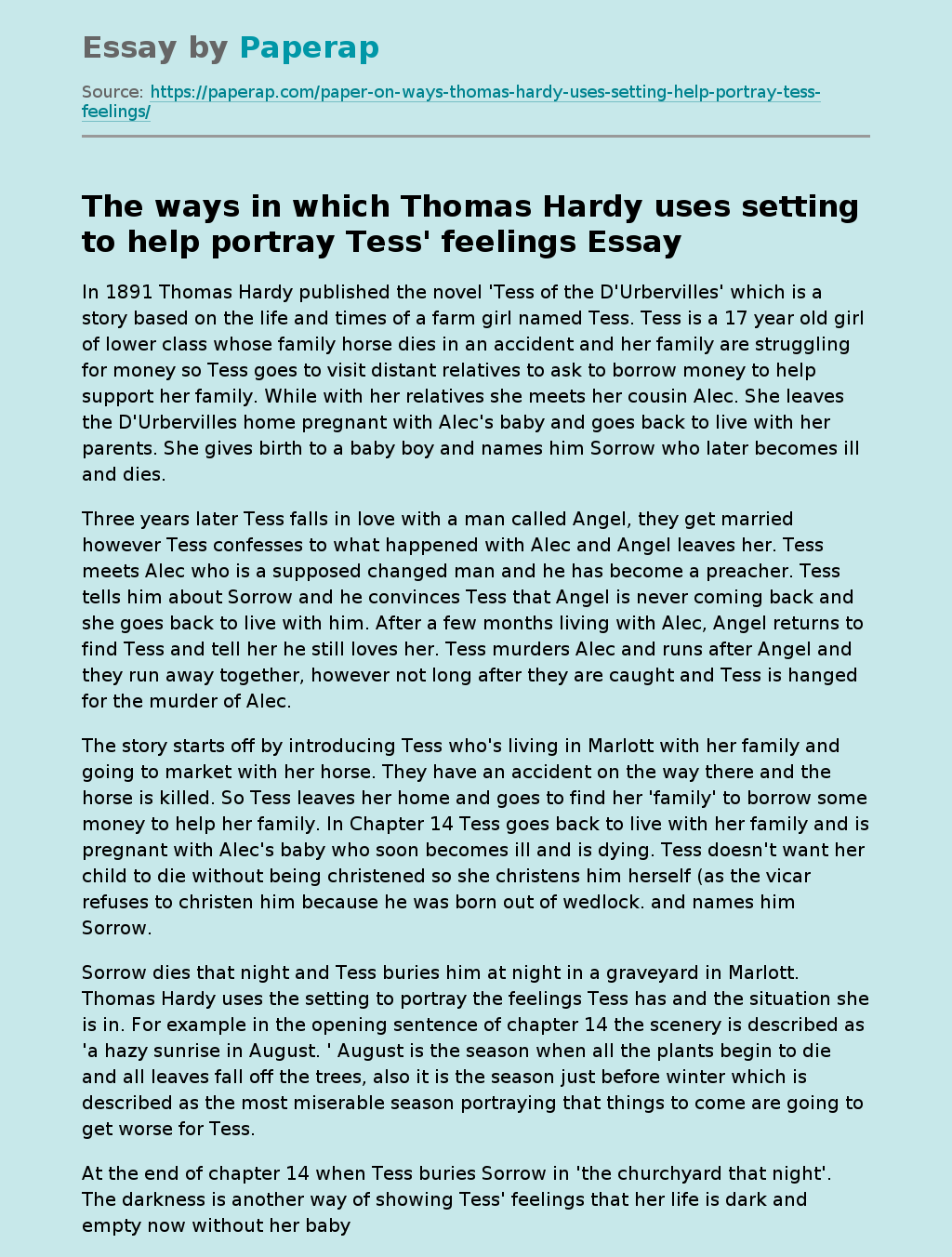The ways in which Thomas Hardy uses setting to help portray Tess' feelings
In 1891 Thomas Hardy published the novel ‘Tess of the D’Urbervilles’ which is a story based on the life and times of a farm girl named Tess. Tess is a 17 year old girl of lower class whose family horse dies in an accident and her family are struggling for money so Tess goes to visit distant relatives to ask to borrow money to help support her family. While with her relatives she meets her cousin Alec. She leaves the D’Urbervilles home pregnant with Alec’s baby and goes back to live with her parents.
She gives birth to a baby boy and names him Sorrow who later becomes ill and dies.
Three years later Tess falls in love with a man called Angel, they get married however Tess confesses to what happened with Alec and Angel leaves her. Tess meets Alec who is a supposed changed man and he has become a preacher. Tess tells him about Sorrow and he convinces Tess that Angel is never coming back and she goes back to live with him.
After a few months living with Alec, Angel returns to find Tess and tell her he still loves her. Tess murders Alec and runs after Angel and they run away together, however not long after they are caught and Tess is hanged for the murder of Alec.
The story starts off by introducing Tess who’s living in Marlott with her family and going to market with her horse. They have an accident on the way there and the horse is killed.
So Tess leaves her home and goes to find her ‘family’ to borrow some money to help her family. In Chapter 14 Tess goes back to live with her family and is pregnant with Alec’s baby who soon becomes ill and is dying. Tess doesn’t want her child to die without being christened so she christens him herself (as the vicar refuses to christen him because he was born out of wedlock. and names him Sorrow.
Sorrow dies that night and Tess buries him at night in a graveyard in Marlott. Thomas Hardy uses the setting to portray the feelings Tess has and the situation she is in. For example in the opening sentence of chapter 14 the scenery is described as ‘a hazy sunrise in August. ‘ August is the season when all the plants begin to die and all leaves fall off the trees, also it is the season just before winter which is described as the most miserable season portraying that things to come are going to get worse for Tess.
At the end of chapter 14 when Tess buries Sorrow in ‘the churchyard that night’. The darkness is another way of showing Tess’ feelings that her life is dark and empty now without her baby and she is ashamed but she has no reason to be. Also her burying her child at night shows Hardy’s feelings about the situation as that he disagrees with what Tess had to go through. Chapter 16 starts with Tess leaving her home to get away from her past and start a new life. Seasons are used again to show the feelings of Tess as ‘spring after her winter’.
Spring is the season of new life and re-growth relating to the plants and animals. ‘Spring after her winter’ suggests Tess is starting over again and her life is looking up compared for her past months which are described as her winter. However within the bright scenery there is what is described as ‘a dark patch in the scenery’ where her ‘useless ancestors’ were buried. This signifies the dark patch on her life that will always be there to remind her of what Alec did to her but she is moving on with her life. Chapters 43 and 47 are after Angel leaves her and she goes to work in Flintcomb Ash.
This is a really low point in Tess’ life as the labour is hard and she is revisited by Alec. Alec finds out about there son Sorrow and is angry at first but invites Tess to come and live with him. Alec is a supposed changed man and is now a Preacher. He convinces Tess Angel is never coming back for her and so she goes to live with him. Thomas Hardy’s descriptions of the scenery around Tess and the way he portrays Tess’ feelings plays a major part in the novel piecing the story together and helping the reader really understand the story and relate to Tess.
Hardy can also do this by using techniques such as pathetic fallacy and similes the weather ‘intentness of youth’ gives life ‘attacked’ takes it away. . Hardy’s descriptions also shows you how he felt about the way Tess was treated and how he feels about how life was back like how he disagrees with the way that women we treated and how they had no rights. This has a big effect on today’s audience and also the audience of back when the novel was written.
It would make the audience realise how unfair the way women were treated was and maybe make them think more about the rights women should have. For today’s audience it makes you see how much society has changed and the views on women have improved and how both sexes are treated equally now in comparison with in the 1890’s when the novel was published. I feel that without Hardy’s descriptions of setting the novel would not be interesting and as gripping and you wouldn’t feel so close and involved with the characters. His descriptions really make the story more intense and interesting.
The ways in which Thomas Hardy uses setting to help portray Tess' feelings. (2017, Oct 09). Retrieved from https://paperap.com/paper-on-ways-thomas-hardy-uses-setting-help-portray-tess-feelings/

